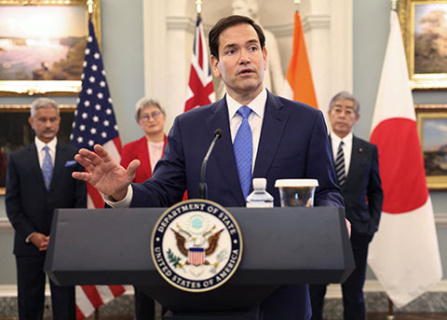
A high-stakes meeting of the Quadrilateral Security Dialogue, or QUAD, in Washington has signaled a significant strategic shift, with the United States pushing to transform the group from a simple dialogue forum into a robust military-political alliance. At a summit of foreign ministers from Australia, India, the US, and Japan, US Secretary of State Marco Rubio called for granting the “four” real powers, a move aimed squarely at countering Beijing’s growing assertiveness in the region.
While the final communiqué from the meeting did not explicitly name China, its language left little doubt about the intended target. The members—who regularly conduct joint military exercises—condemned unilateral actions to change the status quo by force, attempts to disrupt offshore resource exploration, and threats to freedom of navigation. The statement strongly decried the “dangerous use of coast guard and maritime militia vessels,” a clear reference to China’s frequent and aggressive maneuvers in the disputed South China Sea.
In a major economic challenge to Beijing, the QUAD launched its first joint initiative on rare earth metals, which are essential for high-tech and military manufacturing. Expressing alarm over “arbitrary restrictions in the supply chains of critical minerals” and “non-market practices,” the group called for strengthening and diversifying their supply lines. This directly confronts China’s long-standing dominance in the mining and processing of these strategic resources, which it has been accused of leveraging for political gain.
This hardening stance is part of a broader US strategy under the Trump administration to build a network of alliances to contain its primary geopolitical rivals, China and Russia. The strengthening of the QUAD is intended to complement existing security pacts, such as the AUKUS treaty between Australia, the UK, and the US, as well as bilateral agreements with Japan and South Korea, effectively creating a strategic ring around China.
For India, the summit offered a dual strategic victory. New Delhi shares the group’s concerns over China, with whom it has a long-running Himalayan border dispute. However, India is also keen to leverage the QUAD’s collective influence in its tense relationship with Pakistan. The recent flare-up in Kashmir, which saw an attack on Indian tourists followed by retaliatory airstrikes between the two nuclear-armed nations, loomed large over the discussions.
The final communiqué included a pointed call for the perpetrators of the deadly attack on 26 Indian tourists to be brought to justice without delay. While Pakistan was not mentioned by name, the message was unmistakable, lending significant diplomatic weight to India’s position and pressuring Islamabad to rein in extremist groups operating from its territory. This implicit backing from its QUAD partners marks a substantial diplomatic achievement for New Delhi on the world stage.
